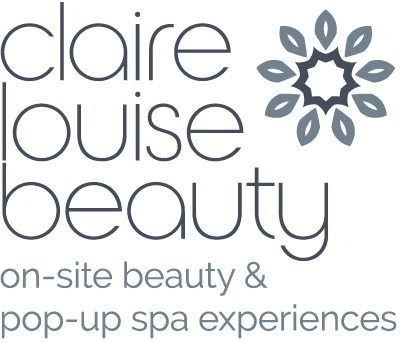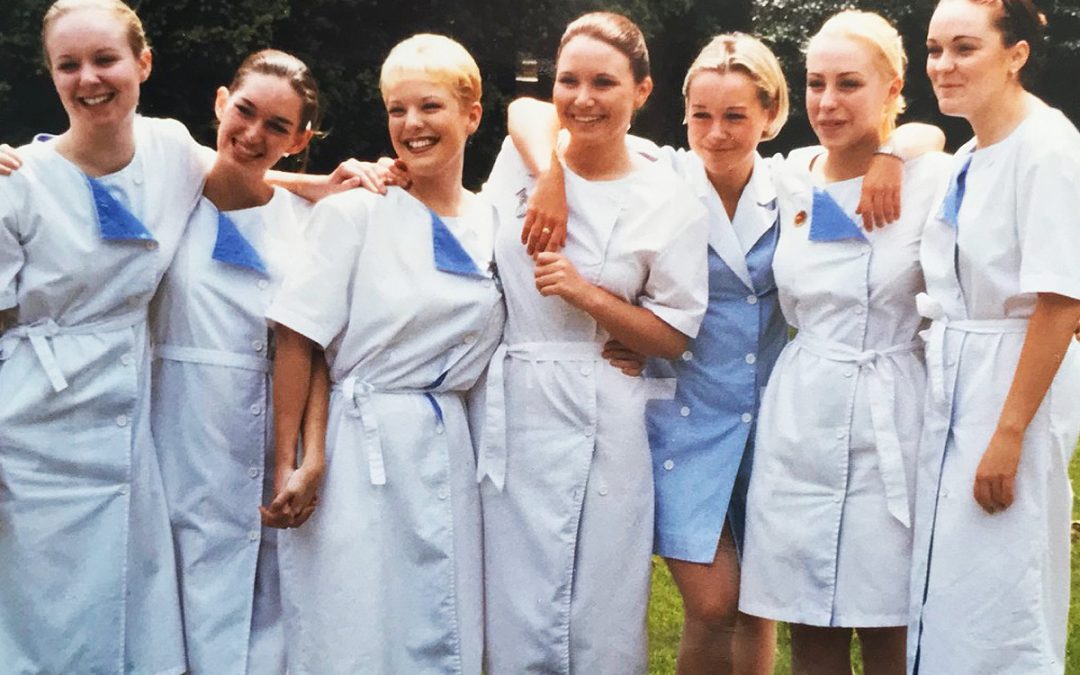Let me give you my background from all that time ago….
My training was with CIDESCO and CIBTAC in Nottingham at the Park School of Beauty Therapy in 1998. The course was full time, five days per week over a ten month period. Strict does not even cover it. I feel a better word for it would be uncompromising.
I thought school was strict, but school was a nice fluffy, warm place compared to the Park School,with Ms Percival heading up the army of tutors. Amongst them they had years of industry experience and although strict, they also had a fairness and approachability about them. I do recall however, there was one in particular terrifying individual called Mary, who worked as the college receptionist. Even her clothes were scary. The course consisted of facial units and make up at the beginning of the programme and then moved in to body massage, psychiatrics and dietary advice during the second trimester.
Before we even attempted to cross the threshold we had to adhere to the following uniform rules…
Hair in a tight bun with bun net and no flyaways. Full day make up including three eyeshadows (90’s style) no nail varnish, acrylic nails (the wearing of these may have led to a days solitary confinement in Ms Percival’s broom cupboard) white tights, flat pumps and an over ironed, spray starched, cardboard style white dress, that would attract all the wrong attention when out in various retail settings after college with the rest of our fellow students. You can probably imagine the sort of attention I am referring to.
On a more serious note, the standards were high and they were high for a reason. Hygiene, cross contamination and sterilization were top of the list. From day one at the college we learned how to work safely and hygienically to protect ourselves and the client. All the metal tools were in the Autoclave at the end of each session, sponges, mask brushes, plastic spatulas would all be stored overnight in the UV cabinet having been washed thoroughly with hot soapy water. Students would fail their exam if they were not seen to be VISIBLY saying to the client post consultation, “I am just going to wash my hands.” You could complete the most perfect facial, but if you had not informed your client of intended hand washing at the start, it was in instant fail. All bottles and containers were wiped with surgical spirit before going into the dispensary and there was a daily salon cleaning rota, which needed to be signed each day.
At the end of the night, the tutor would come round each trolley with a cotton disk saturated with surgical spirit. If the trolley was dirty, you were marked down. The tutor would do the same after the second cleanse, if the cotton disk still had signs of make up, you were marked down. For body massage, if you went over time by five minutes you were marked down. We had to clean the wires of the facial and body electrical machines with surgical spirit and sometimes even a toothbrush.
For practical body massage assessment I distinctly remember rows of beds and the CIDESCO examiner asking us to cease working, and she would ask each one of us a question individually, in front of the class. “Give me the exact origin and insertion of that muscle,” or another favourite for Faradic was “Now show me how to pad the back…” or “Give me five benefits of Iontophoresis” and so on. The point I am trying to make here is the standard was high, and we were expected to know on the spot, preparing us for industry.
The practical exams were also coupled with written examinations where we had to draw diagrams of the skin and other areas of the body, from scratch. Throughout the Easter holidays I remember working in a salon for valuable work experience gaining points needed to contribute towards my final mark. With the same strict standards in the salon as those back at the college.
People were proud to be in the industry and took appearance and professional ethics incredibly seriously. Therapists and tutors displayed badges on their uniforms showing their qualifications and hung certificates, pride of place on salon walls.
As mentioned previously in this post I have also worked within Further Education colleges teaching beauty therapy delivering both VTCT and NVQ qualifications. My personal experience with this was that standards and hygiene were exceptional and still are to this day.
I believe one of the biggest challenges faced by tutors in these environments is uniform. Beauty is so accessible today and students may already have regularly visited salons, seen how girls present themselves out in industry and think – why are we having to be so regimented in college? The answer is again, standards and good practice. You would not be allowed to present yourself to work for a brand such as Clarins, wearing your own top and trousers. Or as an office worker, the office may have a dress code staff have to adhere to. The same applies for the beauty industry, and collages are there to not only prepare students for work within beauty, but for work in whatever field they may choose to work in thereafter.
Marnie Coyle from Macclesfield College said, when asked how many students actually go on to work within industry, ‘Media about 15/20 but this differs year in year out and beauty can be incredibly varied between 5 and 8.’ Marnie also went on to stress that it does vary year in year out and she also agrees often we are teaching students the softer skills needed in life, those we all need to gain prior to joining the workforce.
So what are the comparisons between FE colleges and fast track training providers? In my experience the standards are so incredibly varied and it depends purely on tutor to tutor experience.
Since moving in to lockdown many private training colleges are starting to do ‘virtual’ online training courses where students can use their mobile phones or tablets to access training delivered via apps such as Zoom. The tutor will do a small demonstration/webinar of the practical work referring to course notes and then case studies of work are submitted at a later date. Assements follow and then once deemed competent, the student is issued with a certificate.
Kerry Murphy owner of The Brow Rehab in Bolton completed the prestigious Nouveau Contour semi permanent make up qualification gave me her opinion. She had noticed many webinars and online training courses popping up on platforms such as Instagram, especially during lockdown. Kerry’s opinion is clear, how can people be taught an intricate treatment such as Microblading via Zoom? And then from a health and safety aspect? In order to gain full insurance for a treatment such as Microblading, you need access to a proper premises, running water, risk assessments and equipment at the recommended height (how many of us therapists out there know how important this is and suffer back issues!) Even something as basic as good lighting needs to be taken in to consideration here. So how are these people ensuring their ‘learners’ have all this in place before even considering commencing a treatment?
The list can go on according to Kerry. Facial structure and skin analysis, cross contamination and health and safety, measuring symmetry, aftercare advice and healing schedules, consultation and client expectations – can online training providers and short webinars really ensure these things are being taught with sufficient depth of knowledge? Can the tutors really sign off these assessments with a clean conscience knowing their side of the street is clean?
Looking back at UNIFORM. My experience of uniform whilst working in private academies was incredibly varied. However, I would say standards were well below par in comparison to those expected within FE. Some of the horrors I experienced were lengthy acrylic nails, last weeks chipped nail varnish, unkempt hair extensions sweeping clients foreheads, jeans, own clothes and quite frankly a very poor show.
Now without being unkind, I cannot say this of all students and some tutors had impeccably high standards but, because students were often self funding and these organisations were operating as private entities, focus was considerably placed around..
Pass them and get them through no matter what. Turn a blind eye. Its not up to me what they do once they go out in to industry. Not my issue I am just here to show them how to do it. We can’t inform head office they have all failed, we must get them through or it will shed a bad light on our training location…
This sort of fear based working environment, with tutors trying to circumvent their way around obstacles in order to pass students no matter what the standard cannot be good. Perhaps this is simply because in most of these organisations, tutors are working on zero hours contracts with little or no working rights, and the thought of losing your job at a moments notice terrifies you so much that you must be seen to be towing the line.
But at what cost?
Charlotte Rye of Charlotte Rye Beauty in Kent said she feels that short, virtual training courses are an excellent way to teach people manicure or facial techniques at home to use for their own self care, especially during lockdown. I agree, and I feel if delivered for this kind of personal use, these short webinars have their place in industry however I would strongly discourage anyone who wishes to start a business or to gain a professional qualification against following this path.
When selecting courses there are other things to consider. Funding, time and if you are a working mum who is looking to slowly expand your skill set then short, fast paced courses are an excellent choice. In todays busy world I know the importance of flexibility and singular day courses may suit people for a whole host of reasons. Services such as hot stone therapy and lash lift, you may wish to add to your service menu and for this purpose single unit courses are ideal.
Other colleges offer Payl8r finance for courses, helping to spread the initial outlay and making training accessible, in Manchester I would recommend having a look at MIBA They offer high quality beauty therapy, media make up and short courses at their city centre campus. They also offer apprenticeships for 16-18 year olds, blending college learning with on the job experience whilst earning an apprenticeships salary.
I do also take in to consideration that courses such as CIDESCO can be an expensive way of training however many qualifications such as VTCT are also government funded to help people gain new skills. Colleges such as South Trafford College include monthly instalments for full fee courses to help spread the cost over the year.
People have to make informed decisions themselves as to what is right for them, but looking back at my own training life and my career as a therapist I am grateful to have had the opportunity to have trained where I did (strict as it was) and to have had the opportunity to do this full time. I would however, be very wary when enrolling on a course, make sure you do your homework and read online reviews before handing over your hard earned money! If the course looks too easy, it’s possibly a red flag. Remember, not everyone has the skills to train to become a beauty professional, so if someone says ‘anyone can do it’ move away!


